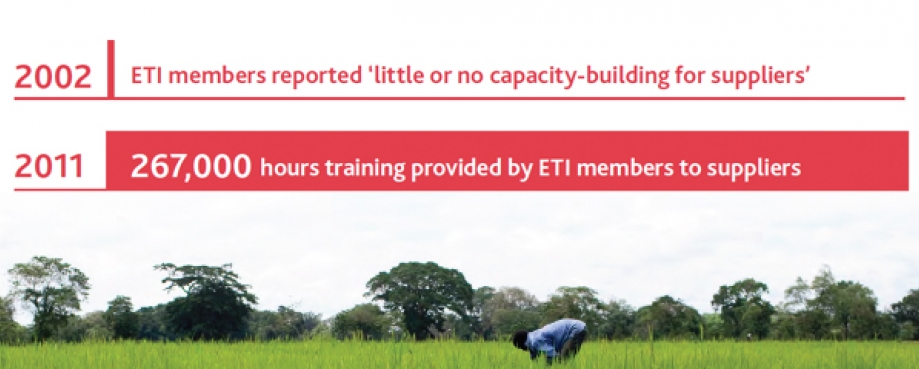
As ETI is introducing a new reporting regime in the form of forward-looking strategic plans for its more advanced members, we thought this was a timely moment to look back over what’s changed (and what’s not) over the ten year period that Ergon has been analysing ETI members’ annual reports.
Since 2002 ETI membership has grown from 25 reporting members to more than 70. Also in that time, the scale of ETI’s activities and its ‘footprint’ have expanded commensurately. For example, the number of audits increased from 7,731 in 2002 to 17,700 in 2010, while individual improvement actions at supplier sites rose in the same time period from 1,200 to more than 126,000. Undoubtedly some of this expansion relates to improved detail in reporting, but the scale of the change is clear.
Equally significant is the progress in the embedding of ethical trade within member practices. Back in 2002, one of the key issues was a mismatch between many member codes and the ETI Base Code, largely related to living wage and freedom of association/collective bargaining. This inconsistency has largely disappeared.
Similarly, activities that most members would now consider as a standard part of their ethical trade processes were embryonic or non-existent 10 years ago. Engagement with suppliers was largely limited to communication of code requirements in contracts or occasionally supplier manuals. Action related to purchasing practices was minimal, and in relation to capacity-building for suppliers we noted that ‘the majority of companies report little or no activity in this area’ though some members were starting to include ethical trade in supplier conferences or to appoint internal ethical champions. By contrast, in 2011, ETI members reported more than 267,000 person hours in training for suppliers, and a wide range offered implementation tools and on-site support to suppliers, as well as participation in innovative and collaborative projects.
However, there are other findings where progress has been limited. The pattern of compliance across Base Code provisions remains unchanged, with health & safety, wages and hours accounting for more than 70% of all improvements actions in both 2002 and 2011. There are also loud contemporary echoes in the key challenges noted in our report to the ETI board for 2002. These included the need to:
- Increase understanding and application of the living wage provisions
- Develop annual reporting so that it produces meaningful information without being burdensome, particularly for small companies
- Tackle the high level of non-compliances
- Improve performance target-setting by members
- Ensure that lower tier suppliers implement the Base Code
These issues are largely about implementation and processes, but perhaps what has changed most over the past decade is the degree of understanding in the ethical trade community of where the most acute risks of labour abuses are to be found, either geographically or within value chains, and the ways in which ethical trade programmes can positively impact workers. Whereas the previous reporting framework was built around reporting back on audit programmes, going forward, it needs to be focused on sharing good practice about effecting beneficial changes in workers’ lives, together with developing and reporting against indicators that demonstrate real improvements in working conditions and livelihoods.
